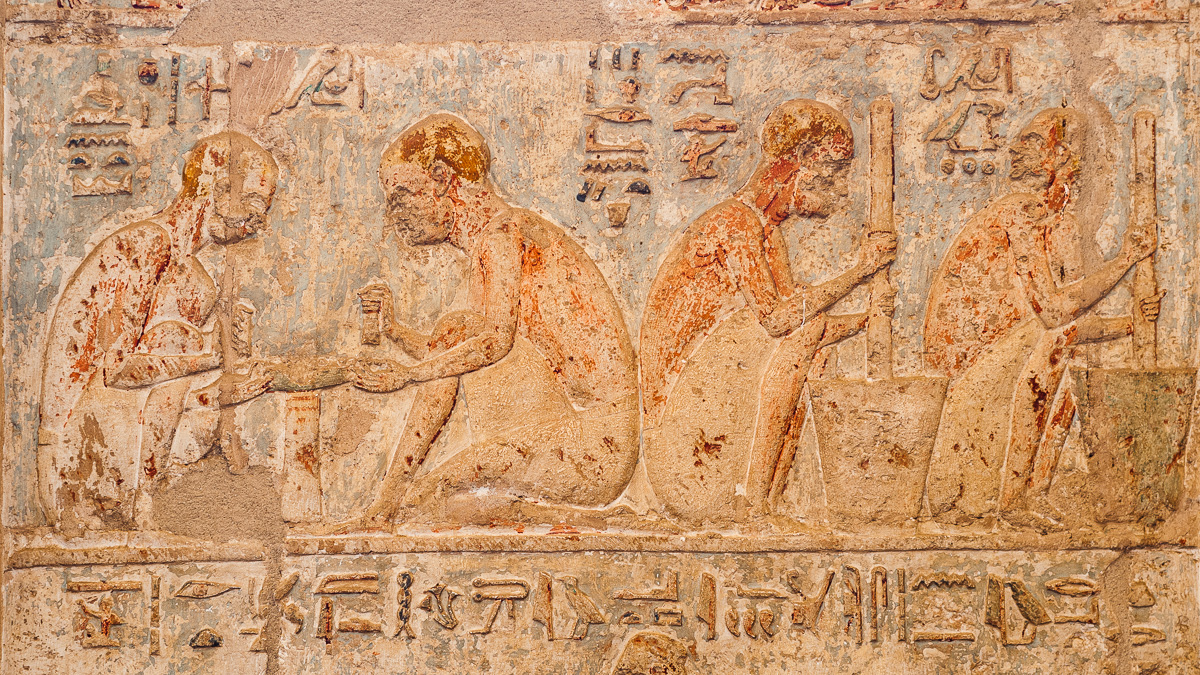About
How Greco-Egyptian Perfumery Shaped Science and Culture
Alchemies of Scent aims to deepen our understanding of the material and practical techniques of Greco-Egyptian perfumery, a practice central to the history of alchemy, chemistry, medicine, and the broader cultural heritage of the Mediterranean and Europe.

Mission
Alchemies of Scent (GAČR Grant ID GM21-30494M) is a research group funded by the Junior Star Program of the Czech Science Foundation, made up of scholars and artists from the humanities, natural and computer sciences, perfumery, and olfactory art. The group studies ancient Egyptian and Greek perfumery using a variety of methods to better understand its role in the history of chemistry and science, and its relationship with art, craft, and culture in the ancient Mediterranean world.
The group’s research focuses on encounters between Egyptian and Greek artists, craftspeople, philosophers, and doctors, as recorded in both written and archaeological sources. These records reveal how technologies and ideas related to perfumery were exchanged and adapted from the time of Alexander the Great’s occupation of Egypt to the reign of Cleopatra VII (4th–1st centuries BCE).
Methodology
Ancient perfume recipes can be puzzling—many are cryptic, and while it’s surprising, there’s little agreement on which plants were used, how ingredients were processed, or even how those processes help lead to the final perfume.
To solve these mysteries, we combine historical research with hands-on experiments. Our process unfolds in three steps: first, we gather all existing scholarly interpretations of the recipes. Next, we test them by recreating the perfumes following these interpretations but using the latest botanical research and analytical techniques, including spectrometry, GCxGC-MS, polyvariant analysis, and DNA sequencing. Finally, we combine our results to determine which interpretations best fit the data.
We are focusing on five perfume recipes found in both Egyptian and Greek texts, each representing a key technique—mechanical extraction of essential oils, deodorizing carrier oils, improving scent absorption, maceration (similar to enfleurage), and early distillation. By reconstructing these methods, we gain new insight into the materials and methods of ancient perfumers—brining part of their reality both before our eyes and under our noses.
Objectives
Trace the Language Ancient Greco-Egyptian Perfumery.
One of our main objectives is to find out how Egyptian, Greek, and Latin perfumery terms have been interpreted through the centuries. Rather than settling on a single meaning or identification for words like stacte or stypsis, we look at how practitioners and scholars have shifted their understandings across different periods and cultures. This evolving vocabulary not only reflects linguistic and conceptual changes, but also guides us in designing experiments to test ancient techniques in new ways.
Replicate the Techniques of Five Greco-Egyptian Perfume Recipes
Instead of simply recreating lost perfumes, we reconstruct the methods behind them. Because ancient recipes can be unclear, we rely on experimental replication and chemistry to test different interpretations. This lets us learn not only what ancient perfumers did but also why they did it, as we observe the chemical effects of each technique. In turn, this approach reveals how they extracted, blended, and transformed materials, offering deeper insights into the science and craft of scent production in antiquity.
Produce a New History of Greco-Egyptian Perfumery
Our research goes beyond the lab, integrating findings from our lexicon and experimental work into broader studies of ancient Mediterranean perfumery, alchemy, and material science. We challenge traditional categories like “Greek,” “Egyptian,” “East,” and “West,” showing that scents from neighboring cultures can be more alike than those used in different periods of the same culture—or even within the same period, depending on social status or gender. Through regular meetings, guest lectures, conferences, and workshops, we connect scholars across disciplines to deepen our understanding of ancient scent practices. Together with an international team of experts, we are producing Perfume Production in the Ancient World, a volume that explores perfume-making techniques across diverse ancient cultures. For more details on our project outcomes, please visit our research page.
Teach the History of Science, Craft, Scent, and Culture
Our aim is to share ancient perfumery with a broad academic and public audience by collaborating with practitioners, artists, and industry professionals. Through hands-on perfume-making workshops, scent-immersion theater, public lectures, and exhibitions, we turn historical texts into nose-forward experiences. In doing so, we explore how to interpret ancient writings and reveal insights into Egyptian and Greek science, medicine, and culture through scent and craft.
Partners
We are part of the Department for the Study of Ancient and Medieval Thought at the Institute of Philosophy, Czech Academy of Sciences.
Our work is carried out with the cooperation of Dr Ullrich Jahn and the Chemistry of Natural Products Group at the Institute for Organic Chemistry and Biochemistry, Czech Academy of Sciences.
Our visual design is by Christoph Geiger.
Contact
- alchemiesofscent@flu.cas.cz
- +420 226 884 808
- Jilská 1, 110 00, Praha 1, Czechia